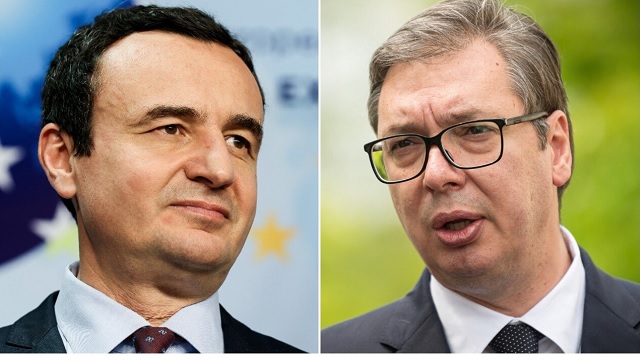The US and EU are exterting a lot of pressure on Kosova Prime Minister Kurti to agree to create an Association of Serb-majority Municipalities in negotiations with Serbian President Vucic. Kurti has set six conditions:
1. The association must be by the Constitution and laws in force in the Republic of Kosova.
2. The association cannot be monoethnic, must change its name, cannot have/carry any public (or executive) power, and must only serve the horizontal cooperation of municipalities according to the Constitution and the law on local self-government (Chapter 5).
3. The association is part of the final agreement and is implemented after mutual recognition. And, in connection with the latter, only after Serbia accepts the principles of the UN Charter in its interstate relations with the Republic of Kosova.
4. Before the establishment of the Association, the illegal structures of Serbia in the north of Kosova are extinguished and all illegal weapons are handed over.
5. The rights of national minorities and the relevant protective mechanisms should strengthen the principle of reciprocity between the two respective states, as well as take into account European standards and models.
6. The President of Serbia withdraws the letters sent to five (and other) EU member states for not accepting the application of the Republic of Kosova for EU membership (which also represents a violation of the same Thaçi-Dacic agreement of 19 April 2013).
One by one
These conditions are a step forward, even if they fall short of the Prishtina proposal for the association that I have suggested. Let’s examine the conditions one by one.
The requirement that any association conform to the Kosova constitution is now well-establshed. As for Kosova’s laws, I am not certain what conforming to them would entail. In any event, laws can be changed, if mutual interest requires it.
Here too there is some consensus that the association should not be monoethnic. There are non-Serbs who live in Serb-majority municipalities. Municipalities in Kosova have subsantial powers that in theory might be pooled through horizontal cooperation. But the powers should remain with the individual munipalities. I understand why the Prime Minister might like for the association to have a different name, but a rose by any other name smells just as sweet (or sour).
This is a vital point. The association will pose a far lesser threat to Kosova’s sovereignty and territorial integrity if it is implemented after Serbia has accepted that sovereignty and territorial integrity. I have no reason to believe that Serbia has accepted this point.
Yes, creation of the association should be the occasion for disbanding all illegal structures and armed groups that Belgrade supports inside Kosova. This should include all employees of the Serbian security services. All activities of Serbia inside Kosova should become transparent and accountable.
Yes again. Whatever Serbs get inside Kosova Belgrade should offer inside Serbia to Albanian-majority municipalities. Reciprocity is the rule between states. Serbia has not accepted this point, to my knowledge.
Serbia’s efforts to prevent Kosova membership in international organizations, including the EU, will have to cease once an agreement is reached. Without this, there is no normalization.
Overall
I have no reason to believe that Belgrade is seriously considering meeting several of these conditions. Whether it does so will depend on pressures from Washington and Brussels. So far, the pressure on Belgrade has been sporadic and inconsistent. The Americans and Europeans fear pushing Serbia further into the philo-Russian, pro-China camp. The pressure on Prishtina is high and unrelenting. I call it diplomatic bullying, undertaken because Kosova has no alternative but to look West. Now that Prime Minister Kurti has met the Americans partway, I hope they will forget some of their resentments of his past. Most of his six conditions are eminently reasonable, though I would add a seventh: the US and EU should act as guarantors of any agreement, ensuring its good-faith implementation.
The problem is that Brussels and Washington are unlikely to be able to convince President Vucic to accept even the most reasonable of Kurti’s conditions. Vucic has intentionally stoked his nationalist opposition with a daily media diet of accusations and vituperation against Kosova Albanians. He faces no serious threat from Serbia’s relatively small liberal democratic opposition. Nor does he see much upside to resolving the conflict with Kosova. Serbia would then need to institute serious reforms in order to prepare itself for EU accession. Some of those reforms would pose political and judicial risks to Vucic’s hold on power.
I continue to hope I am wrong. But a decent agreement between Kosova and Serbia still seems far off.
